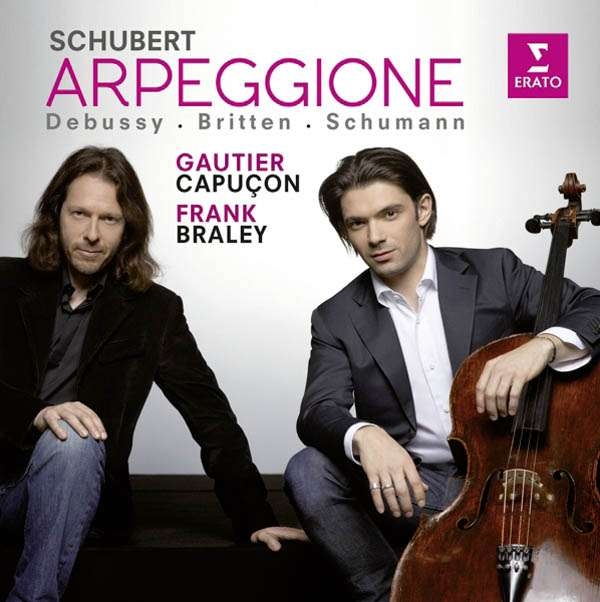Košík
Váš košík je momentálne prázdny.
Schubert: Arpeggione D.821
12,00 € 16,99 €
Formát:
CD
Dostupnosť:
na sklade / dostupné okamžite
EAN kód:
5099993415828
Autori:
Benjamin Britten, Claude Debussy, Franz Schubert, Robert Schumann
Interpreti:
Frank Braley, Gautier Capuçon
Vydavateľ:
WARNER CLASSICS
Zoznam skladieb
Franz Schubert: Arpeggione, D.821Sonata in A major for arpeggione and piano
I. Allegro Moderato
II. Adagio
III. Allegretto
Robert Schumann: Fünf Stücke im Volkston, Op. 102
I. Vanitas vanitatum - Mit Humor
II. Langsam
III. Nicht schnell, mit viel Ton zu spielen
IV. Nicht zu rasch
V. Stark und markiert
Claude Debussy: Sonata for cello and piano
I. Prologue
II. Sérénade
III. Finale
Britten: Sonata for cello and piano in C major, Op. 65
I. Dialogo
II. Scherzo - Pizzicato
III. Elegia
IV. Marcia
V. Moto perpetuo
Popis
The spirit of the cello from Schubert to Britten
Gautier Capuçon and Frank Braley's album Arpeggione
The Capuçon brothers Renaud and Gautier and pianist Frank Braley: for years a guarantor of the finest chamber music from Viennese classical to classical modern, from Beethoven to Schubert and Brahms to Ravel and Fauré. Now cellist Gautier Capuçon is opening a new chapter together with Frank Braley: an album with Schubert's famous Arpeggione Sonata and works from Schumann and Debussy to Britten
It was in 1824 that Schubert wrote a work for the instrument called the "arpeggione" - a forgotten hybrid of guitar and cello invented during that time. Today, the great sonata has not only established itself as a masterpiece of Schubert's chamber music, it has become, in the common cello version, the archetype of the Romantic cello sonata. This is where Gautier Capuçon and Frank Braley come in when they emphasize the narrative gesture of this music and continue its traditions: Robert Schumann, a great admirer of Schubert, broke with the formal precepts of the sonata in favor of free character pieces in his Five Pieces in Folk Tone. Claude Debussy, on the other hand, viewed the genre in his late work through the colorful light of emerging modernism. Finally, with Benjamin Britten - who who, in the words of Gautier Capuçon, wrote his Sonata for Mstislav Rostropovich in 1961, a work that is far too rarely performed - this classical modernism meets brilliant virtuosity. Prihlásenie
Newsletter



